Growth Curve
The inexact science of raising kids
Sign up for our newsletter
We summarize the week's scientific breakthroughs every Thursday.
-
 Health & Medicine
Health & MedicineKids’ me time may boost brainpower
Unstructured play may give kids more opportunity to exercise their executive function, complex cognitive function that includes resisting impulses and paying attention.
-
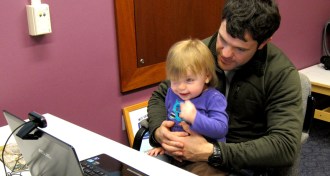 Health & Medicine
Health & MedicineYour baby can watch movies for science
Any parent with a computer can let their kid participate in child development studies through a new website called Lookit.
-
 Health & Medicine
Health & MedicinePregnant women on the hook for calculating risks, benefits of fish
New draft FDA guidelines on fish for pregnant or nursing women make women do the math for how to maximize omega-3 fatty acids and minimize mercury exposure.
-
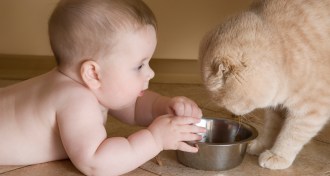 Health & Medicine
Health & MedicineIf timing’s right, cats and roaches may be good for kids’ allergies
Exposure to mice, roaches and cats before a child’s first birthday may confer protection against asthma and allergies, a new study suggests.
-
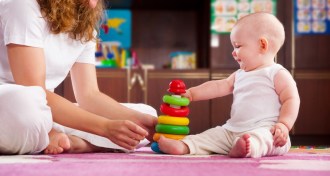 Health & Medicine
Health & MedicineYour baby: The ultimate science experiment
Babies may be serious scientists, but parents can join the fun by trying some simple experiments with their kids.
-
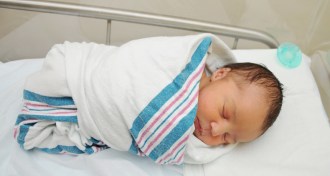 Health & Medicine
Health & MedicineBaby’s first bacteria arrive sooner than we thought
Forget what you’ve heard. The womb is most definitely not sterile.
-
 Health & Medicine
Health & MedicineStudy on pregnant women’s driving has some potholes
New study finds that pregnancy makes women get into more car accidents, but there could be a simpler explanation.
-
 Health & Medicine
Health & MedicineMom’s nutrition puts a stamp on baby’s DNA
A new study is the latest in a growing list of how the environment sculpts a person’s epigenome.
-
 Health & Medicine
Health & MedicineInduced labor doesn’t necessarily kick off cascade of interventions
A large analysis of clinical trials finds that jump-starting labor actually leads to fewer C-sections, a finding that runs contrary to common birthing wisdom.
-
 Health & Medicine
Health & MedicineBabies cry at night to prevent siblings, scientist suggests
Babies who demand to be breastfed in the night might be delaying the birth of a sibling, scientist proposes.
-
 Health & Medicine
Health & MedicineWhat’s going on in the mind of a Skyping baby?
By studying how young children respond to video calls, scientists hope to understand the role of new technology.
-
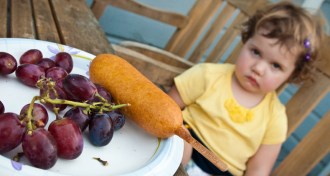 Health & Medicine
Health & MedicineIf your kid hates broccoli, try, try again
Repeated exposure to foods may be the antidote to picky eating.